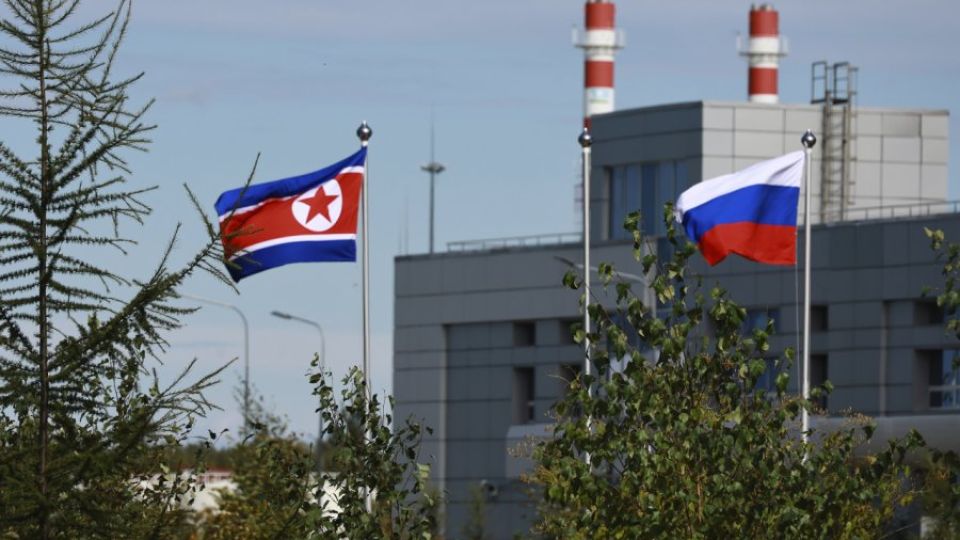November 3, 2023
SEOUL – North Korean and Russian flags are seen at the Vostochny cosmodrome outside the city of Tsiolkovsky, about 200 kilometers from the city of Blagoveshchensk in the far eastern Amur region, Russia, on Sept. 13, 2023. (File Photo – AP)
The South Korean military on Thursday said it has detected indications that North Korea has delivered short-range ballistic missiles, in addition to artillery shells and rockets, to support Russia’s invasion of Ukraine.
The South Korean military disclosed that North Korea is suspected of supplying a variety of weapons and equipment to Russia by holding a closed-door briefing on arms trade and military cooperation between Moscow and Pyongyang, marking the first such instance since the outbreak of the war in Ukraine in February 2022.
South Korea has identified signs of North Korea’s supply of short-range ballistic missiles to Russia based on information “from various sources,” one senior military official said on condition of anonymity when asked by The Korea Herald whether Seoul has evidence of such transfers.
North Korea appears to still be supplying Russia with SRBMs, according to the official.
“We are monitoring the potential transportation of short-range ballistic missiles by both train and aircraft, as this mode of transportation is deemed feasible,” the official noted, adding, “We are closely watching the situation, and we are currently detecting emerging signs.”
The official explained that North Korea would face logistical challenges in transporting SRBMs by ships due to the dimensions of the shipping containers bound for Russia, which are approximately 6 meters in length and 2.5 to 2.6 meters in width.
For comparison, the KN-23 SRBM can measure 7.5 meters in length, according to the database provided by the Center for Strategic and International Studies in Washington.
The South Korean military assesses that North Korea might seek to transport a trio of newly developed SRBMs to Russia. These missiles include the KN-23, the KN-24 and the “super-large caliber” multiple-rocket launcher known as the KN-25, which South Korea categorizes as a ballistic missile system.
The military additionally indicated that North Korea is presumed to have supplied 122-millimeter shells suitable for multiple rocket launchers, along with 152 mm artillery shells that are mutually compatible with both countries.
“It is estimated that around 2,000 containers have been dispatched to Russia through the Rajin Port to date,” the official shared Seoul’s assessment. The delivery is thought to have been initiated in August.
“Assuming these containers are loaded with 122 mm shells for multiple rocket launchers, the estimate exceeds 200,000 rounds. If these containers are loaded with 152 mm shells, the estimate surpasses 1 million rounds.”
Furthermore, North Korea is suspected of having provided Russia with T-series tank ammunition, including T-55 and T-62 models.
The military’s assessment also suggests that North Korea might potentially offer to Russia a range of other weapons, including multiple rocket launchers, field artillery, rifles, machine guns, portable anti-aircraft and anti-tank missiles.
Evidence of North Korea’s weapon supplies to Russia first emerged around mid-2022, but it significantly intensified, especially in August, just ahead of North Korean leader Kim Jong-un’s September visit to Russia.
In line with this pattern, containers originating from Russia have been detected not only in the vicinity of North Korea’s northeastern Rajin Port, a key maritime gateway connecting Russia and North Korea but also in multiple locations across North Korea since August.
“It is worth noting that containers are emerging in nearly every region of North Korea,” the unnamed official said, characterizing the situation as “unusual.”
“We have (seen) a notable presence of containers in proximity to North Korean ammunition facilities, indicating the possibility of a significant quantity of ammunition and related materials being transported (to Russia).”
Russian containers are also primarily found in areas adjacent to railroad tracks, often used for storage, sorting, and the loading and unloading of railroad cars.
The use of sea routes for weapons trade between Russia and North Korea has become noticeably more active since October.
During the period from August to September, it was common for a single ship to undertake a weekly voyage.
However, in October, the frequency increased, with three to four ships frequently shuttling between Russia and North Korea. A ship regularly berths at Rajin Port every three to four days.
The unnamed official explained that, on average, two of these ships typically enter the North Korean port per week.
As a reciprocal arrangement, the military believes that Russia has been providing technical guidance to North Korea concerning the third launch of what North Korea claims to be a military reconnaissance satellite. This launch was initially planned for October.
North Korea could be seeking assistance in various domains, such as Russia’s support for the development of satellite technology, nuclear-related technology transfers and collaboration, aid in the realm of fighter aircraft or their components, and support for the establishment of air defense systems, according to the South Korean military.
Pyongyang could also potentially request captured Western weapons from Russian forces in Ukraine in exchange for their lethal weapons supplies, as the country might be interested in “obtaining the technical information contained within these weapons,” the official explained.
The military assesses that “North Korea is expected to prioritize receiving initial support in the form of food and fuel to ensure regime stability and navigate through the upcoming winter” in a document.
“Following this, both will have discussions encompassing the transfer of military technology, the modernization of conventional military capabilities, and the organization of joint training exercises.”


